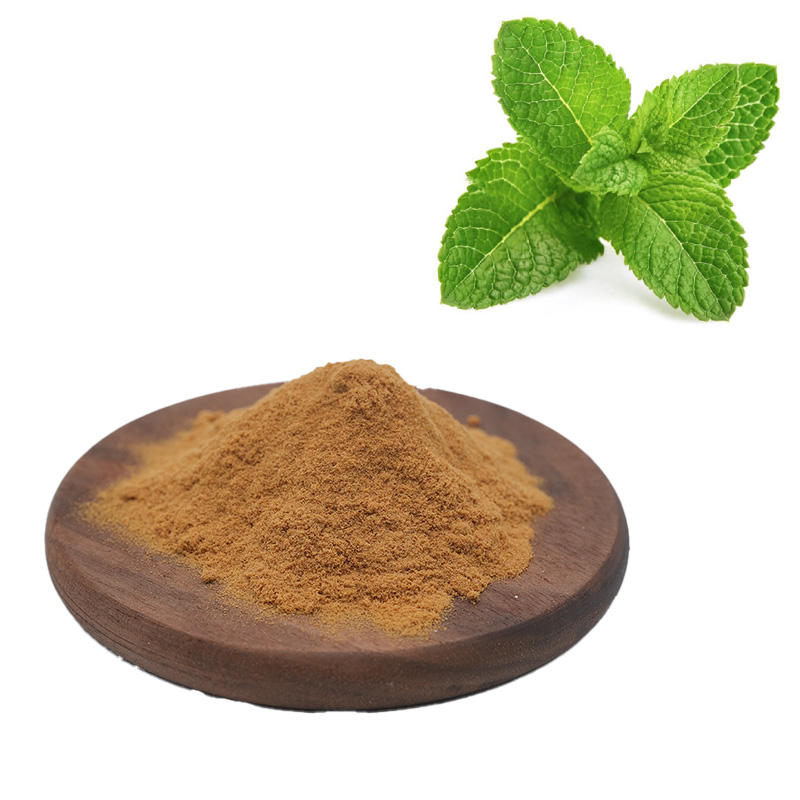Peppermint Leaf Extract: Uses, Benefits, and Potential Side Effects
Peppermint (Mentha piperita) is a popular herb known for its refreshing aroma and numerous health benefits. One of the most common forms of peppermint used in medicinal applications is its extract, derived from the leaves of the plant. This article explores the uses, benefits, and potential side effects of peppermint leaf extract.
Uses:
1.Digestive Health: Peppermint leaf extract is widely used to alleviate digestive discomfort. It contains compounds like menthol that can help relax the muscles of the gastrointestinal tract, reducing symptoms such as bloating, gas, and indigestion.
2.Oral Health: Due to its antimicrobial properties, peppermint leaf extract is often included in oral hygiene products such as toothpaste and mouthwash. It can help combat bad breath and prevent the growth of bacteria that contribute to dental plaque and gum disease.
3.Respiratory Support: Inhalation of peppermint oil, a concentrated form of peppermint extract, may provide relief from respiratory issues such as congestion, coughs, and sinusitis. The menthol in peppermint has a cooling effect that can soothe irritated airways.
4.Pain Relief: Peppermint leaf extract may have analgesic properties that make it effective in reducing headache pain, muscle soreness, and tension. Applying a diluted solution topically or inhaling its aroma may help alleviate discomfort.
Benefits:
1.Relieves Irritable Bowel Syndrome (IBS) Symptoms: Studies suggest that peppermint oil, when taken in enteric-coated capsules to prevent stomach irritation, can significantly reduce symptoms of IBS, including abdominal pain, bloating, and gas.
2.Improves Mental Clarity and Alertness: The invigorating scent of peppermint has been shown to enhance cognitive function, including memory, attention, and alertness. Diffusing peppermint oil or using it in aromatherapy may help promote mental clarity and focus.
3.Antimicrobial Activity: Peppermint leaf extract exhibits broad-spectrum antimicrobial activity against various pathogens, including bacteria, fungi, and viruses. This property makes it valuable for supporting immune function and fighting infections.
4.Alleviates Menstrual Cramps: Some research suggests that peppermint oil applied topically or taken orally may help reduce the severity and duration of menstrual cramps, possibly due to its muscle-relaxing effects.
Potential Side Effects:
1.While peppermint leaf extract is generally considered safe for most people when used as directed, it may cause adverse reactions in some individuals, including:
2.Heartburn or Acid Reflux: Peppermint can relax the lower esophageal sphincter, allowing stomach acid to flow back into the esophagus and exacerbating symptoms of heartburn or acid reflux in susceptible individuals.
3.Allergic Reactions: Rarely, individuals may experience allergic reactions to peppermint, such as skin irritation, rash, or respiratory symptoms like wheezing or difficulty breathing.
4.Drug Interactions: Peppermint leaf extract may interact with certain medications, including drugs for acid reflux, diabetes, and blood pressure. It's essential to consult with a healthcare provider before using peppermint extract if you're taking any medications.
In conclusion, peppermint leaf extract offers a range of potential health benefits, particularly for digestive, oral, and respiratory health. However, it's essential to use it cautiously and consult with a healthcare professional, especially if you have underlying health conditions or are taking medications.

Layla Liu
WhatsAPP:+0086 18809263088
Post time: Mar-02-2024


